Richaardt Lingenfelder is a third generation farmer next to the Theewaterskloof, South Africa’s fourth largest dam (built on land that previously belonged to their family).
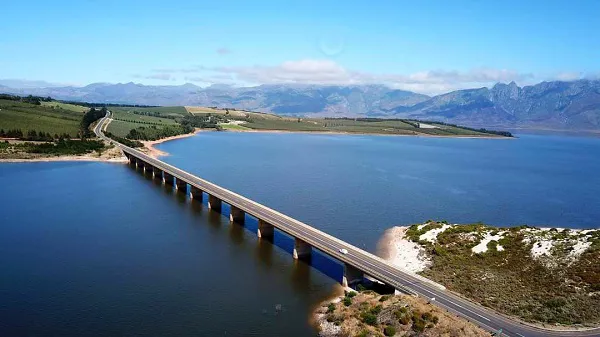
The Theewaterskloof Dam
“On Arendsig we have 50ha of fruit apples and pears, and a little bit of plums. We’re very privileged to have this water here and we are also in a very high rainfall area here. Normally we get 800mm, over 900mm per year past two years while during the drought, in 2017, we only had 350mm.”
The Western Cape has had an unusual amount of rain this summer which could be associated with the long-lived tropical cyclone Freddy that has caused extensive damage in Mozambique and Malawi.
“We’re very grateful for the recent rain because loadshedding makes irrigation very challenging. You do lose a few harvest days but we are always glad for rain. However, we feel very sorry for the farmers who had hail recently.”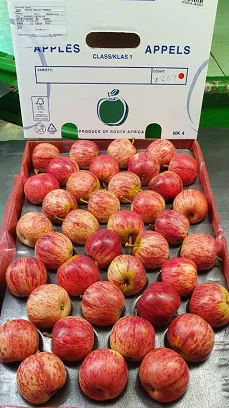 He continues: "We haven’t finished the Royal Gala season. We are very busy with Packhams. We should have finished by now but we’re a bit behind because of the weather. Our Packhams were initially very clean and high packouts but with the previous rains there was strong wind and some fruit were blown off and some developed chaffing marks. The wind is a challenge.”
He continues: "We haven’t finished the Royal Gala season. We are very busy with Packhams. We should have finished by now but we’re a bit behind because of the weather. Our Packhams were initially very clean and high packouts but with the previous rains there was strong wind and some fruit were blown off and some developed chaffing marks. The wind is a challenge.”
Apart from being a farmer, Richaardt also exports a portion of the crop.
“When you export yourself then you’re on the ball, because you know the needs of your clients,” he notes.
South Africa should guard against oversupplying the East
“Our area is very good for Packhams, Grannies and Goldens (we grow a yellow Golden here), typically older varieties. Galas too, but a lot of the bicoloureds battle here because we don’t get the cold units growers in Ceres and in the Koo Valley get. They give you volumes, and volumes pay the bills. You can’t live with 20 or 30 tonnes per ha. We go up to 110 t/ha on Grannies and Goldens and on Packhams we get 90 tonnes per ha.”
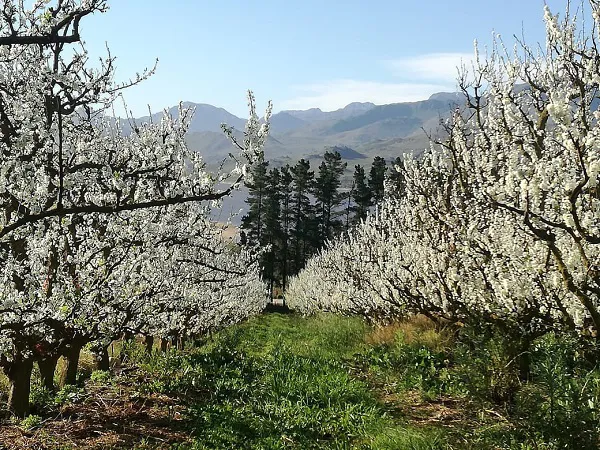
He remarks that buyers in Malaysia remark that they prefer South African Grannies, which they like to juice and mix with crushed ice. “We think it has to do with our sunshine which result in high sugars. South Africa has a taste advantage. Looks sell, but taste plays a role, that’s what importers tell us.”
The Malaysian market has the benefit of accepting a wide spectrum of Granny Smith apples.
Over the last fifteen years a largescale shift eastwards has occurred in South Africa’s apple trade but Richaardt quotes an exporter who cautions that South Africa should guard against oversupplying those markets with apples.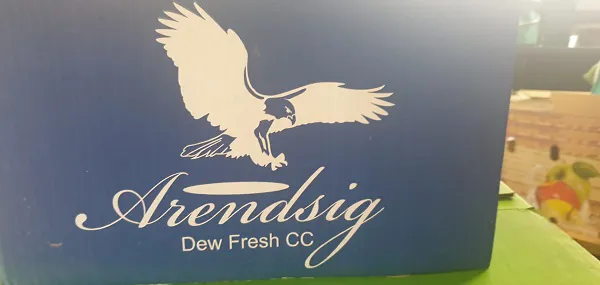
“We’re cautious of Europe. The EU got hurt with the war and payments from Russia are still problematic.”
He adds that the general South African public probably wasn’t aware of the importance of Russia for South African apples and pears because Russia takes a class EU2.
“We had a lot of fruit on the way to Russia when the war started last year, that was a big challenge and we had to offload in other countries at a loss. We’ll see when the Packhams start whether we send to Russia this year. Russia used to take 30 to 40% of the crop. This year it could be 20%, it has dropped a lot.”
Their pomefruit are also sold in Africa through third party exporters.
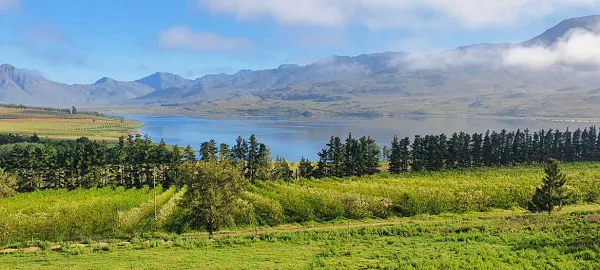
South Africa’s unstable electricity grid
South Africa’s national electricity supply is unstable and the country experienced the most loadshedding (scheduled power cuts) ever in 2022.
“Six to eight hours a day our pumps are down, and if the power goes on at whichever time at night you have to get up and get the pumps working. It’s a challenging time for a fruit industry, I’m a third-generation farmer, we know what farming is about but we are going through a very challenging phase.”
At the moment there are times when they have no electricity for up to ten hours a day.
“On the farm we generate 26kW through solar panels and that helps a lot. For the first time now if the banks check your credit status they ask you about your solar capability and they ask how much renewable energy do you have? You have to think out of the box.”
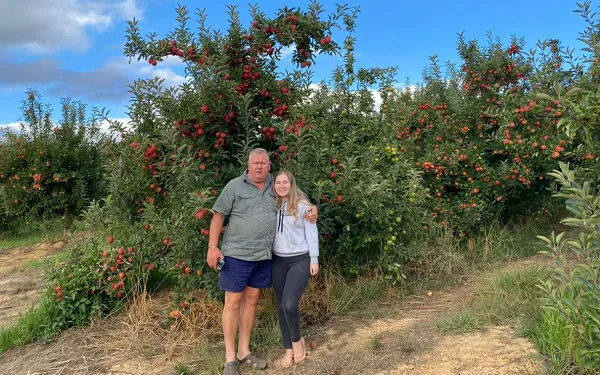
Richaardt Lingenfelder and his daughter in a block of Brookfield Gala apples
Citrus direct competitor to pomefruit
This year domestic pomefruit prices opened at a lower level because of the carry-over CA stock.
“With our new fruit we entered a market that was already saturated. It has also affected the new season of pear exports to India because of CA pears that were recently opened.”
He adds: “The supply of fruit of all types is just too high from the Southern Hemisphere. Argentina and Chile are strong competitors, placing their fruit at prices which we just cannot equal.”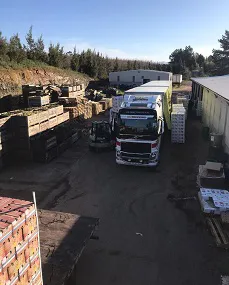 There has been a significant amount of CA stock from the previous season, specifically Goldens.
There has been a significant amount of CA stock from the previous season, specifically Goldens.
“Personally I think there were perhaps too many apples stored but I’d say the reason is the massive amount of citrus that came to the local market last year. There was an incredible amount of citrus on the local market, and at the end it’s about price and if you can buy only one type of fruit and if you can get citrus so cheaply, you’re not going to buy apples.”
The presence of so much citrus led to apples kept back in the CA rooms.
"When the citrus at last came to an end by mid-October last year there were still so many apples in CA that there was little time to market that stock before the new season started, and so we had fresh apples on the market competing with carry-over CA stock.”
The domestic apple market was “chaotic” last year. “The worst domestic apple market since I entered the industry in 1993, by far.”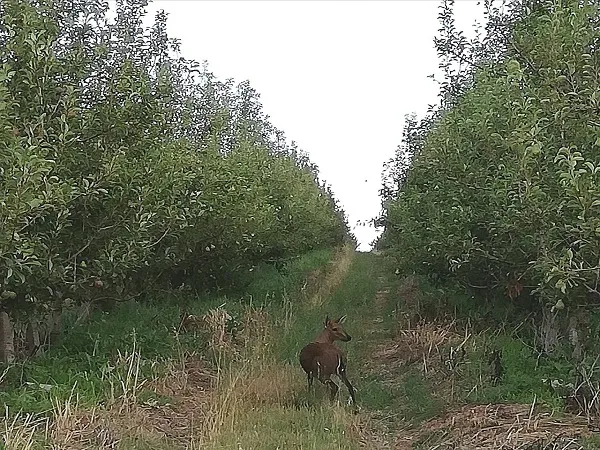
An antelope in a pear orchard
For more information:
Richaardt Lingenfelder
Arendsig
Tel: +27 28 841 4444
Email: richaard@breede.co.za
